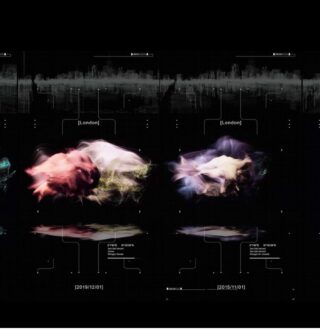Climate Ring Opening Symposium: Sino-Swiss Visions for a Sustainable Future
-
![]()
Program, Academia Tech&Ethics II: Navigating Innovation and Integrity in Life Sciences
Building on the success of Tech&Ethics: Shaping Digital Integrity in 2024, Swissnex in China is proud to announce the next chapter of this initiative which aims to increase Switzerland’s knowledge and competencies on China.
Info & tickets
Agenda
18:00 – 18:30 Registration
18:30 – 18:40 Welcome & Opening Remarks
18:40 – 19:00 “Stories from the Frontline of Climate Action”
- Emotions for the planet: The role of emotions and affective science in advancing climate action by Prof. Tobias Brosch, Department of Psychology at University of Geneva
- Awakened and Exhausted: The Fate of Soils in Climate Change by Prof. Zimeng Wang, Department of Environmental Science and Engineering at Fudan University
19:00 – 19:35 “Breakthrough Ideas: Sino-Swiss Solutions in Action”
- Frontiers Planet Prize Announcement & Keynote from National Champion, Christy Wang, Public Affairs and Advocacy Lead, Frontiers
- From Research to Teaching (to Design Practice): Decarbonising Cities through Urban Building Energy Modelling by Dr. Zhongming Shi,Product Lead of the City Energy Analyst (CEA) ,ETH Zurich
- Hands to Tackle the Global Climate Crisis: Sino-Swiss Zero-Emission-Building Project by Yin Li, Local Lead Expert of the Sino-Swiss Zero-Emission-Building (ZEB) Project
19:35 – 20:05 “The Future We Want: A Collaborative Discussion”
- The Future We Build: Re-thinking Cooperation in International Climate Law by Dr. Elena Cima, Senior Lecturer in Public International Law at the University of Geneva
- Re-thinking Atmosphere by Khalil Berro, Artist
- Speculative Climate Design: Sino-Swiss Alpine Landscapes in the Future by Prof. Bin Li, School of Architecture at Central Academy of Fine Arts
20:05 – 20:35 Open Discussion
- Panelists: Swiss & Chinese experts from above sessions
- Interactive Element: one bold climate vision for 2050
20:35 – 20:40 Closing Remarks
20:40 – 21:30 Networking Reception
Speakers
-
![]()
Bio
Prof. Tobias Brosch
Professor in Psychology, Chair for Psychology of Sustainable Development, University of GenevaTobias Brosch is Professor at the University of Geneva, Switzerland, where he holds the chair for Psychology of Sustainable Development. His research integrates psychology, affective sciences, behavioral economics, and neuroscience to explore the cognitive and affective mechanisms driving energy consumption and pro-environmental actions. Notably, he has investigated the role of emotions in climate change perception and action, contributing to the development of psychological interventions to combat climate disinformation. His work emphasizes the importance of affective processes in promoting sustainable decision-making and has been instrumental in shaping strategies to encourage environmentally responsible behavior. This research has been published in more than 80 peer-reviewed articles in journals including PNAS, Nature Energy, Nature Climate Change, and Nature Human Behavior. He moreover actively engages with policy makers to bring insights from behavioral science into policy work and to promote science-policy collaborations. He regularly consults for institutions such as the World Economic Forum, the Swiss Federal Office of Energy, or the Office of the High Commissioner for Human Rights. He is representative of the American Psychological Association (APA), the European Federation of Psychologists’ Associations (EFPA), and the Swiss Federation of Psychologists (SFP) to the United Nations.
-
![]()
Bio
Prof. Zimeng Wang
Professor at Fudan University, Executive President of the Young Faculty Association, and Editor-in-Chief of Applied GeochemistryDr. Zimeng Wang is a Professor at Fudan University, Executive President of its Young Faculty Association, and Editor-in-Chief of Applied Geochemistry, the official journal of International Association of Geochemistry (IAGC). He earned his B.Sc. from Fudan University and Ph.D. from Washington University in St. Louis, with postdoctoral research at Stanford University and faculty experience at Louisiana State University. In 2018, Dr. Wang joined Fudan through China’s national talent recruitment program, leading a research team focused on soil environmental sciencewith a courtesy affiliation at the IRDR International Center of Excellence. He received honors including the ACS James J. Morgan Award, IAGC Ebelmen Awardand various awards for his popular science contributions, published over 80 articles in journals such as Nature Geoscience and Science Advances, and directed over ten national research projects. He also serves as a council member of IAGC and holds leadership roles in prominent Chinese scientific societies.
-
![]()
Bio
Dr. Zhongming Shi
Product Lead of City Energy Analyst, Lecturer at ETH ZurichDr. Zhongming Shi is the Product Lead of the City Energy Analyst (CEA), one of the first open-source urban building energy modelling platforms supporting low-carbon urban design. At ETH Zurich, he also teaches the studio-based course Integrated Design Project, which bridges urban design with decarbonisation strategies. Recent studio topics include the densification of Zurich’s Altstetten and the regeneration of the former Shanghai Expo site.
Zhongming completed his PhD with Prof. Arno Schlueter at ETH Zurich’s Future Cities Laboratory in Singapore. He previously led a research project on building-integrated agriculture in collaboration with the National University of Singapore, and is currently leading a new project on decarbonising Chinese cities in partnership with Tongji University.
-
![]()
Bio
Yin Li
Local Lead Expert of the Sino-Swiss Zero-Emission-Building (ZEB) Project and registered Architect SIA/ETH in SwitzerlandYin Li holds a Bachelor’s degree in Architecture from Zhejiang University and a Master’s degree at ETH Zurich. After graduating, he worked for eight years at Giuliani Hönger Architekten in Zurich, Switzerland, during which he also obtained an MAS Master of Advanced Study in Building Energy Engineering from Lucerne University of Applied Sciences and Arts (HSLU). In 2022, he returned to China to continue his work in architecture and consulting as the specially appointed local lead expert for the Sino-Swiss ZEB Project. He has engaged in architectural practice in various locations, led architectural design competitions in Shenzhen and Switzerland, and is frequently invited to participate in teaching practices and guest lectures at several universities.
-
![]()
Bio
Dr. Elena Cima
Senior Lecturer in Public International Law at the University of GenevaElena Cima is a Senior Lecturer in Public International Law at the University of Geneva, where she teaches courses on international environmental and climate law, energy law, and investment law. She is the Director of the University of Geneva’s Summer School in International Law and International Humanitarian Law. She also serves as external faculty at Sciences Po Paris and at the World Trade Institute in Berne. Elena holds a PhD in International Law from the Geneva Graduate Institute, a Bachelor of Laws from the University of Milan and an LL.M degree from Yale Law School. She is the author of the monograph From Exception to Promotion: Re-Thinking the Relationship between International Trade and Environmental Law (Brill, 2021). She has co-edited several books and has published articles in peer-reviewed journals on international trade law, climate law, water law, as well as investment law. In addition to her academic commitments, Elena is often involved in investment arbitrations, international water and climate negotiations, as well as advisory proceedings before international courts and tribunals.
-
![]()
Bio
Khalil Berro
ArtistKhalil Berro’s work treats the world as a relational object, shaped by desire, power, and control. At the core of the Swiss-Lebanese artist’s approach lies a poetic engagement with acute locations and environmental sciences, reconfiguring and proposing new modes of perception of the non-human (nature).
His process begins not with a concept, but with a journey, collaborations with scientists, dedicated field research in remote and precarious locations, materialized through methods that range from the highly technological to the dangerously crude. Berro’s research has led his work deep into Arctic coal mines, across chemically-cleared Indonesian palm oil fields, and atop Alpine peaks, launching rockets into clouds to seed artificial rain. Each encounter brings its own ambivalence, its own revelation about the dynamics between humanity and its habitat.
Through film, photography, sculpture, and installation, Berro stages these tensions, making them palpable. His images disorient, proposing new ways of sensing what has always been there, challenging established environmental and cultural realities.
-
![]()
Bio
Prof. Bin Li
Associate Professor at School of Architecture, Central Academy of Fine ArtsBin Li is Associate Professor at School of Architecture, Central Academy of Fine Arts. She is a multidisciplinary architect and holds a Master of Architecture from MIT and BA from The University of Hong Kong. Her design research draws on “Climate Design in the Anthropocene”: geomorphic landscape and future architecture under climate change and the urbanization of countryside, landscape routes and architectural pauses, as well as transdisciplinary, transcultural, and transcalar perceptions of space and place. Bin received her PhD in urbanism and landscape from The Oslo School of Architecture and Design and has taught at universities in Europe. She publishes with renowned academic design journals such as Thresholds(MIT Press) and JoLA. Her design and artistic works have been exhibited and gained international awards such as the MIT Legatum Fellow and the Swiss Arts Council artist (design and architecture).
Partners
Climate Ring Shanghai
-
![]()
Art Exhibits – Climate Ring Shanghai
April 22, 2025 — April 26, 2025In a world increasingly shaped by climate change and ecological interconnection, BREATHE by Khalil Berro, Twin Cloud by Black Void, and Apocalyptic Optimists by Juliana Schneider invite us to reflect on our place in a shared, more-than-human world.
-
![]()
Breathing Clouds: Art, Science, and the Air We Share
April 26, 2025This roundtable brings together artists, scientists, and environmental thinkers to explore the intersections of art, science, and policy through the lens of air and clouds, elements that are both invisible and essential, shaping history, climate change, and human experience.
-
![]()
Earth Day Climate Fresk Workshop
April 26, 2025The best fighters need to study their opponent. Where they punch hard. What are their patterns. How they became who they are. Come and study our common opponent Climate Change in a fun and interactive way through the Climate Fresk Workshop. And get ready to join the fight yourself.
-
![]()
Behavioral Insights for Climate Action
April 26, 2025This roundtable explores how behavioral science can drive climate action by examining the psychological, social, and cognitive factors influencing environmental decision-making. Experts will share insights from neuroscience, psychology, and policy implementation to foster sustainable behaviors and effective interventions.
-
![]()
Innovation Night for Climate
April 25, 2025Innovation is often viewed as a vital solution to global challenges such as climate change. However, it also presents its own set of contradictions. This event will explore the complex relationship between climate action and innovation, where bold ideas promise transformation but may also lead to unintended consequences.
-
![]()
The Future Speaks for Itself: Youth Perspectives on the Environment
April 25, 2025Rising temperatures and extreme weather events are already being felt across the globe. In consequence, society is gearing up to transition to a more sustainable system, from politics, innovation, to civil society.
-
![]()
Sustainability and Innovation 4 Impact SwissCham PechaKucha Style Night
April 24, 2025This event organized by SwissCham leverages the globally recognized PechaKucha format, where speakers present their ideas using 20 slides, each shown for 20 seconds, resulting in concise yet impactful presentations lasting just 6 minutes and 40 seconds.
-
![]()
CEA-4 Launch Event & Low-Carbon Urban Design Roundtable
April 23, 2025This event will take place alongside the Low-Carbon Urban Design Roundtable, hosted in collaboration with Swissnex in China during Shanghai Climate Week. This roundtable brings together professionals, designers, and agencies to explore how urban planning and design can contribute to decarbonisation.
-
![]()
Climate Ring Shanghai
April 22, 2025 — April 26, 2025Step into the ring. Join the fight for our planet. The Climate Ring Shanghai is a collective battle against climate change. In this ring, we don’t exchange punches but ideas and each “round” of discussion brings us closer to impactful solutions.





























